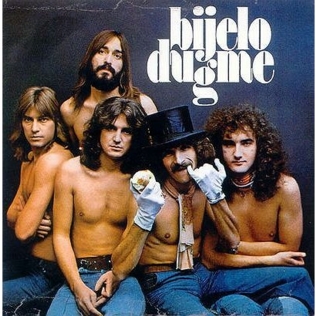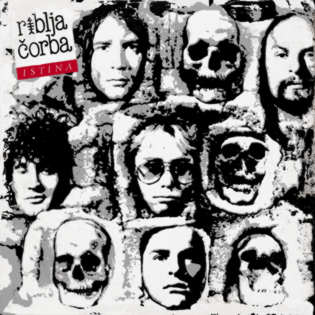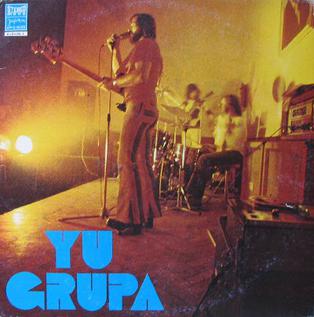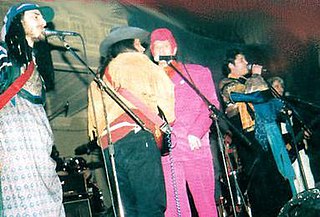
Bajaga i Instruktori are a Serbian and Yugoslav rock band formed in Belgrade in 1984. Founded and led by vocalist, guitarist and principal composer and lyricist Momčilo Bajagić "Bajaga", the group is one of the most notable acts of the Yugoslav rock scene.

Divlje Jagode is a hard rock and heavy metal band, originally formed in 1977 in Sarajevo, SR Bosnia and Herzegovina, SFR Yugoslavia, and since their 1994 reunion based in Croatia. Led by guitarist Sead "Zele" Lipovača, Divlje Jagode are considered one of the most popular and most influential acts of the Yugoslav hard rock and heavy metal scenes.

Bijelo Dugme was a Yugoslav rock band, formed in Sarajevo, SR Bosnia and Herzegovina in 1974. Bijelo Dugme is widely considered to have been the most popular band ever to exist in the former Socialist Federal Republic of Yugoslavia and one of the most notable acts of the Yugoslav rock scene and Yugoslav popular music in general.

Šta bi dao da si na mom mjestu is the second studio album from influential Yugoslav rock band Bijelo Dugme, released in 1975.

Eto! Baš hoću! is the third studio album by Yugoslav rock band Bijelo Dugme, released in 1976.

Bitanga i princeza is the fourth studio album by Yugoslav rock band Bijelo Dugme, released in 1979.

Doživjeti stotu is the fifth studio album by Yugoslav rock band Bijelo Dugme, released in 1980.

Koncert kod Hajdučke česme is the first live album by Yugoslav rock band Bijelo Dugme, released in 1977. The album's title refers to the band's famous concert played on August 28, 1977 near Hajdučka česma grounds at Košutnjak Park in Belgrade. However, the material on the record is only partially recorded at the said event.

Ćiribiribela is the ninth and final studio album by Yugoslav rock band Bijelo Dugme, released in 1988. Bijelo Dugme would split-up in 1989, and Ćirbiribela would be the band's last release before the band's 2005 reunion and the live album Turneja 2005: Sarajevo, Zagreb, Beograd.

Bijelo Dugme is the seventh studio album by Yugoslav rock band Bijelo Dugme, released in 1984. Due to Bijelo Dugme's usage of Uroš Predić's famous painting Kosovo Maiden for the album cover, the album is unofficially known as Kosovka djevojka.

Pljuni i zapjevaj moja Jugoslavijo is the eighth studio album by Yugoslav rock band Bijelo Dugme, released in 1986.

Uspavanka za Radmilu M. is the sixth studio album by the Yugoslav rock band Bijelo Dugme, released in 1983.

Mramor, kamen i željezo is the third live album by Yugoslav rock band Bijelo Dugme, released in 1987. Originally released as a double album, the material was recorded throughout 1987 during the band's tour in support of their Pljuni i zapjevaj moja Jugoslavijo album.

Turneja 2005: Sarajevo, Zagreb, Beograd is the fourth live album by Yugoslav rock band Bijelo Dugme, released in 2006. The album was recorded on Bijelo Dugme's 2005 reunion tour, and is the band's first release since the 1988 studio album Ćiribiribela.

Istina is the sixth studio album released by Serbian and former Yugoslav rock band Riblja Čorba.

Laki Pingvini were a Serbian and Yugoslav rock band formed in Belgrade in 1979.
Dubrovački trubaduri was a Croatian beat, folk and pop band from Dubrovnik formed in 1961 by Đelo Jusić, main composer, guitar and mandolin player and leader of the group. They were very popular in Yugoslavia during the 1960s and 1970s for their mixture of pop music and medieval folk traditions of their native ancient city on the Adriatic coast. Internationally also known as 'Dubrovnic Troubadours or The Troubadours Of Dubrovnik, they enjoyed brief popularity across Western Europe having appeared at the 1968 Eurovision Song Contest in London. Their song "Jedan dan" was performed by their singers Luciano "Lući" Capurso and Hamo Hajdarhodžić and it scored 7th position. Their other major hits include "Dok Palme Njišu Grane" from 1971, and the Italian-influenced "Noćna Muzika" from 1972. The group, in different line-ups, existed until the early 1980s when they broke up.

YU Grupa is the debut studio album from Serbian and former Yugoslav rock band YU Grupa, released in 1973.

The Kuguars were a successful short-lived Serbian comedy rock band from Belgrade, mainly consisting of famous Serbian actors. Formed in 1997, the band released two albums featuring humorous songs, before disbanding in 2001.

New Partisans was a short-lived mid-1980s movement on the Yugoslav rock scene. The term was used to denote albums by Sarajevo-based bands Bijelo Dugme, Plavi Orkestar and Merlin which were characterized by pop rock and power pop sound with elements of folk music and lyrics and imagery heavily inspired by Yugoslav Partisans and the ideals of Yugoslavism.



















